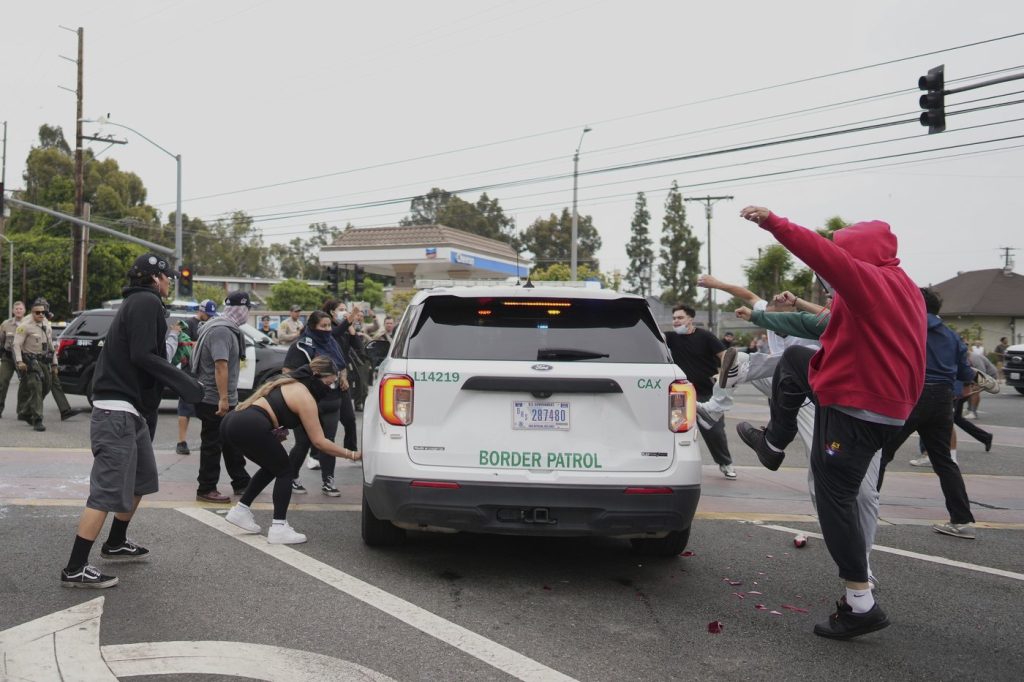President Donald Trump has announced the deployment of 2,000 California National Guard troops to Los Angeles in response to immigration protests, despite opposition from California Governor Gavin Newsom. This marks a continuation of Trump's strategy of activating National Guard troops during unrest, similar to actions taken in 2020 following the murder of George Floyd by a Minneapolis police officer. In that instance, several governors complied with Trump's request to send troops to Washington, D.C. to manage the ensuing protests, while others opted to keep their troops at home.
This particular deployment has stirred controversy as it goes against the typical command structure where the state's governor retains control over the National Guard. Trump justified federalizing the troops by claiming the necessity to "address the lawlessness" in California. In contrast, Governor Newsom criticized the move as "purposely inflammatory" and an escalation of tensions.
When it comes to deploying troops on U.S. soil, the laws are somewhat ambiguous. Generally, federal military forces are prohibited from engaging in civilian law enforcement unless in emergencies. One of the main legal frameworks for such military action is the Insurrection Act, which allows a president to activate military forces during times of rebellion. However, Trump did not invoke the Insurrection Act for this deployment. Instead, he relied on a federal statute that permits the federalization of National Guard troops under specific circumstances.
The National Guard serves dual functions, addressing both state and federal needs. Typically, it operates under state control with state funding, although federal missions can also be assigned. The law quoted in Trump's proclamation places National Guard troops under federal authority under three specific conditions: if the U.S. is being invaded or is in imminent danger; if there is rebellion or risk of rebellion against federal authority; or if the president cannot "execute the laws of the United States" with regular forces. Notably, this law states that orders for federalizing troops "shall be issued through the governors of the States," leading to questions about the president's ability to activate National Guard troops without a governor's order.
Trump's proclamation indicates that the National Guard troops will support Immigration and Customs Enforcement (ICE) officers in enforcing the law, rather than engaging directly in law enforcement activities themselves. Legal experts, such as Georgetown University Law Center professor Steve Vladeck, highlight that the National Guard troops cannot participate in typical law enforcement duties unless the Insurrection Act is invoked. There are concerns that this "protection" role could escalate into situations requiring force.
Historically, various laws including the Insurrection Act have been applied during significant civil rights events. For instance, President Dwight Eisenhower deployed the 101st Airborne Division to protect Black students during the desegregation of Central High School in Little Rock, Arkansas, in 1957. Similarly, in 1992, George H.W. Bush invoked the Insurrection Act to respond to riots in Los Angeles following the acquittal of police officers involved in the beating of Rodney King.
Trump's willingness to utilize military forces domestically has been evident in the past. In 2020, he urged governors to deploy their National Guard troops to Washington, D.C., during protests related to George Floyd's death and even threatened to invoke the Insurrection Act in that context. Yet, he never did so during his first term. Recently, during his 2023 campaign for a second term, Trump suggested that he would not hesitate to invoke the military in case of violence in cities, stating, "I'm not waiting."
Furthermore, Trump has expressed intentions to deploy the National Guard as part of his immigration enforcement plans, with top adviser Stephen Miller outlining strategies for utilizing troops from sympathetic Republican-led states to engage those states that refuse cooperation. Following Trump's recent announcement, Defense Secretary Pete Hegseth indicated that active-duty Marines at Camp Pendleton were on high alert and could be mobilized if violence escalates.











